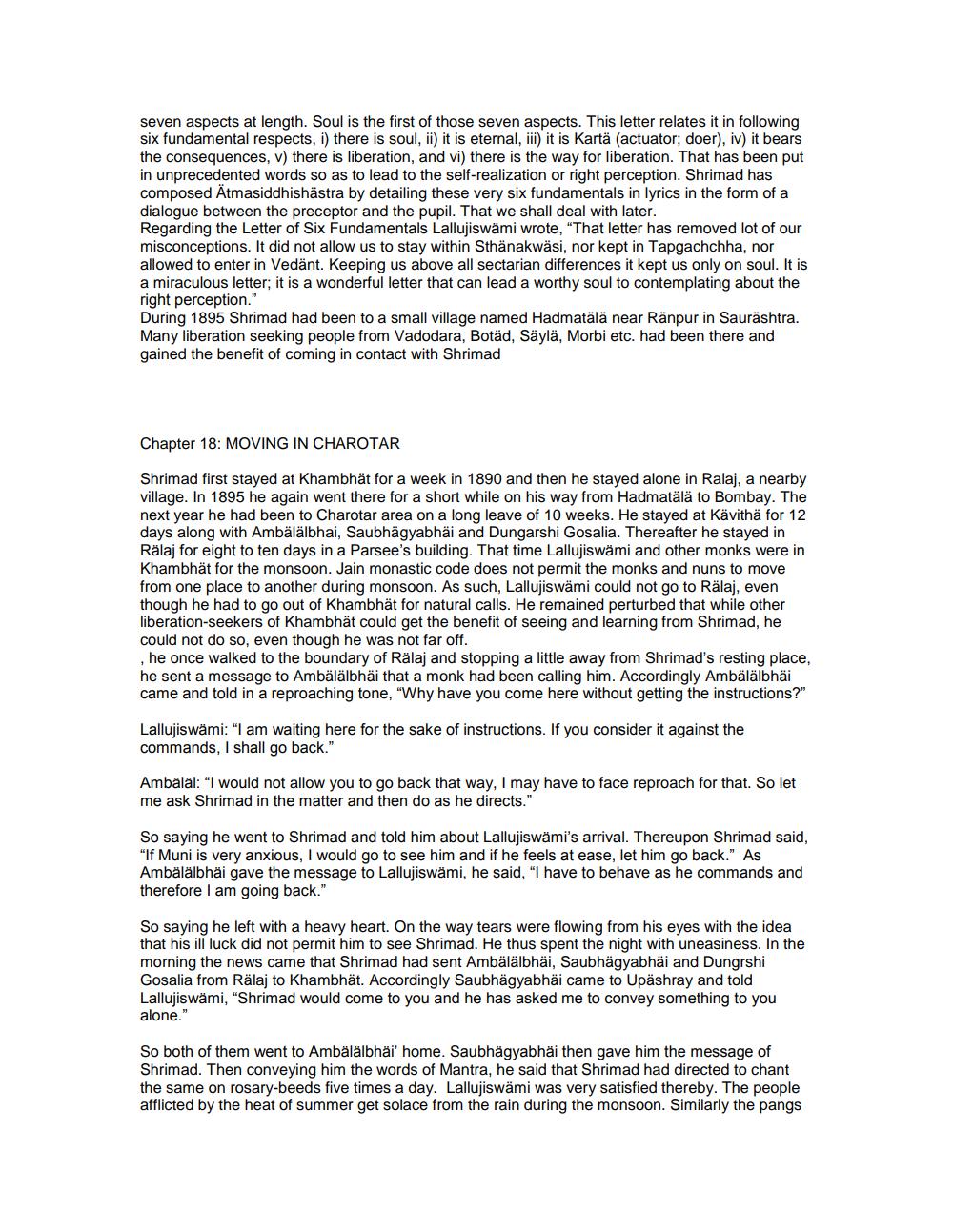________________
seven aspects at length. Soul is the first of those seven aspects. This letter relates it in following six fundamental respects, i) there is soul, ii) it is eternal, iii) it is Kartä (actuator; doer), iv) it bears the consequences, v) there is liberation, and vi) there is the way for liberation. That has been put in unprecedented words so as to lead to the self-realization or right perception. Shrimad has composed Atmasiddhishästra by detailing these very six fundamentals in lyrics in the form of a dialogue between the preceptor and the pupil. That we shall deal with later. Regarding the Letter of Six Fundamentals Lallujiswami wrote, “That letter has removed lot of our misconceptions. It did not allow us to stay within Sthänakwäsi, nor kept in Tapgachchha, nor allowed to enter in Vedänt. Keeping us above all sectarian differences it kept us only on soul. It is a miraculous letter; it is a wonderful letter that can lead a worthy soul to contemplating about the right perception." During 1895 Shrimad had been to a small village named Hadmatälä near Ränpur in Saurashtra. Many liberation seeking people from Vadodara, Botäd, Säylä, Morbi etc. had been there and gained the benefit of coming in contact with Shrimad
Chapter 18: MOVING IN CHAROTAR
Shrimad first stayed at Khambhät for a week in 1890 and then he stayed alone in Ralaj, a nearby village. In 1895 he again went there for a short while on his way from Hadmatälä to Bombay. The next year he had been to Charotar area on a long leave of 10 weeks. He stayed at Kävithä for 12 days along with Ambälälbhai, Saubhagyabhäi and Dungarshi Gosalia. Thereafter he stayed in Rälaj for eight to ten days in a Parsee's building. That time Lallujiswami and other monks were in Khambhät for the monsoon. Jain monastic code does not permit the monks and nuns to move from one place to another during monsoon. As such, Lallujiswami could not go to Rälaj, even though he had to go out of Khambhät for natural calls. He remained perturbed that while other liberation-seekers of Khambhat could get the benefit of seeing and learning from Shrimad, he could not do so, even though he was not far off. , he once walked to the boundary of Rälaj and stopping a little away from Shrimad's resting place, he sent a message to Ambälälbhai that a monk had been calling him. Accordingly Ambälälbhäi came and told in a reproaching tone, "Why have you come here without getting the instructions?"
Lallujiswämi: "I am waiting here for the sake of instructions. If you consider it against the commands, I shall go back."
Ambäläl: "I would not allow you to go back that way, I may have to face reproach for that. So let me ask Shrimad in the matter and then do as he directs."
So saying he went to Shrimad and told him about Lallujiswami's arrival. Thereupon Shrimad said, "If Muni is very anxious, I would go to see him and if he feels at ease, let him go back." As Ambälälbhäi gave the message to Lallujiswämi, he said, "I have to behave as he commands and therefore I am going back."
So saying he left with a heavy heart. On the way tears were flowing from his eyes with the idea that his ill luck did not permit him to see Shrimad. He thus spent the night with uneasiness. In the morning the news came that Shrimad had sent Ambälälbhäi, Saubhagyabhai and Dungrshi Gosalia from Rälaj to Khambhät. Accordingly Saubhagyabhäi came to Upäshray and told Lallujiswämi, "Shrimad would come to you and he has asked me to convey something to you alone.
So both of them went to Ambälälbhäi' home. Saubhagyabhäi then gave him the message of Shrimad. Then conveying him the words of Mantra, he said that Shrimad had directed to chant the same on rosary-beeds five times a day. Lallujiswami was very satisfied thereby. The people afflicted by the heat of summer get solace from the rain during the monsoon. Similarly the pangs




